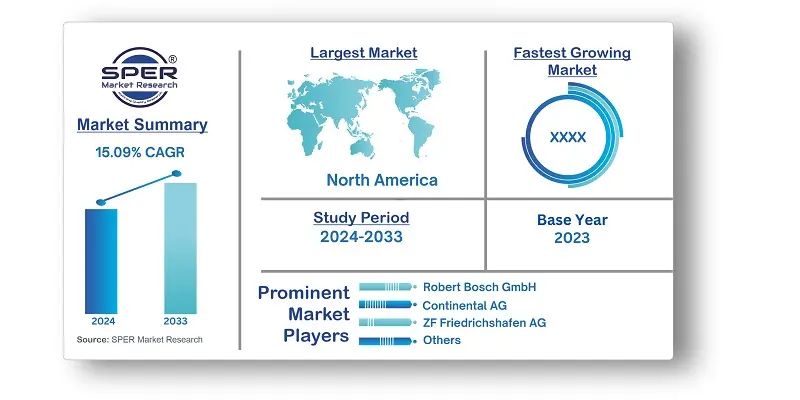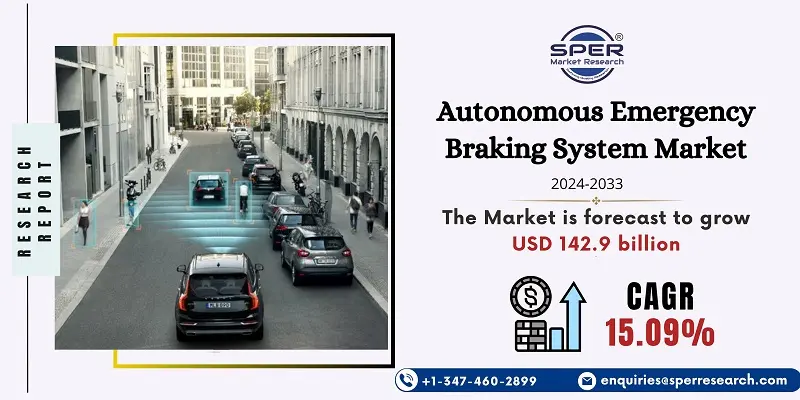
Autonomous Emergency Braking System Market Growth, Size, Trends, Demand and Future Outlook
Autonomous Emergency Braking System Market Size- By System, By Vehicle Type, By Technology- Regional Outlook, Competitive Strategies and Segment Forecast to 2033
| Published: Apr-2024 | Report ID: AMIN24114 | Pages: 1 - 210 | Formats*: |
| Category : Automotive & Transportation | |||
- May 2023: The automated emergency braking feature was added by Tesla for use in reverse. It is projected that this new function will improve reverse safety for both drivers and passengers.
- October 2022: On two heavy-duty trucks, ZF's Commercial Vehicle, a top producer of auto components, independently displayed its "OnGuardMax" autonomous emergency braking system and its adjustable electric power steering feature. These features will soon be available in North America.
- August 2022: An innovative nighttime test for autonomous emergency braking systems was introduced by the Insurance Institute for Highway Safety. The Nissan Pathfinder and the Ford Mustang Mach-E were two of the four models that scored the highest, superior. No credit was given to any other cars, such as the Toyota Tacoma and Nissan Altima.


| Report Metric | Details |
| Market size available for years | 2020-2033 |
| Base year considered | 2023 |
| Forecast period | 2024-2033 |
| Segments covered | By System, By Vehicle Type, By Technology |
| Regions covered | North America, Asia-Pacific, Latin America, Middle East & Africa and Europe |
| Companies Covered | Robert Bosch GmbH, Continental AG, ZF Friedrichshafen AG, Delphi Automotive LLP, Hyundai Mobis, Aisin Seiki Co. Ltd, Hitachi Automotive System Ltd, Mando Corporation, Netradyne, Valeo S.A. |
- Autonomous emergency braking (AEB) system manufacturers
- Distributors and suppliers of autonomous emergency braking systems
- Automotive braking system component manufacturers
- Automotive OEMs
- Industry associations and experts
- Lidar and radar sensor manufacturers and suppliers
| By System: |
|
| Digital Advertising Market: |
|
| By Technology: |
|
- Global Autonomous Emergency Braking System Market Size (FY’2024-FY’2033)
- Overview of Global Autonomous Emergency Braking System Market
- Segmentation of Global Autonomous Emergency Braking System Market By System (Low Speed AEBS, High Speed AEBS, Others)
- Segmentation of Global Autonomous Emergency Braking System Market By Vehicle Type (Passenger Cars, Commercial Vehicles)
- Segmentation of Global Autonomous Emergency Braking System Market By Technology (Crash Imminent Braking, Dynamic Brake Support, Forward Collision Warning)
- Statistical Snap of Global Autonomous Emergency Braking System Market
- Expansion Analysis of Global Autonomous Emergency Braking System Market
- Problems and Obstacles in Global Autonomous Emergency Braking System Market
- Competitive Landscape in the Global Autonomous Emergency Braking System Market
- Impact of COVID-19 and Demonetization on Global Autonomous Emergency Braking System Market
- Details on Current Investment in Global Autonomous Emergency Braking System Market
- Competitive Analysis of Global Autonomous Emergency Braking System Market
- Prominent Players in the Global Autonomous Emergency Braking System Market
- SWOT Analysis of Global Autonomous Emergency Braking System Market
- Global Autonomous Emergency Braking System Market Future Outlook and Projections (FY’2024-FY’2033)
- Recommendations from Analyst
1.1. Scope of the report1.2. Market segment analysis
2.1. Research data source2.1.1. Secondary Data2.1.2. Primary Data2.1.3. SPER’s internal database2.1.4. Premium insight from KOL’s2.2. Market size estimation2.2.1. Top-down and Bottom-up approach2.3. Data triangulation
4.1. Driver, Restraint, Opportunity and Challenges analysis4.1.1. Drivers4.1.2. Restraints4.1.3. Opportunities4.1.4. Challenges4.2. COVID-19 Impacts of the Global Autonomous Emergency Braking System Market
5.1. SWOT Analysis5.1.1. Strengths5.1.2. Weaknesses5.1.3. Opportunities5.1.4. Threats5.2. PESTEL Analysis5.2.1. Political Landscape5.2.2. Economic Landscape5.2.3. Social Landscape5.2.4. Technological Landscape5.2.5. Environmental Landscape5.2.6. Legal Landscape5.3. PORTER’s Five Forces5.3.1. Bargaining power of suppliers5.3.2. Bargaining power of buyers5.3.3. Threat of Substitute5.3.4. Threat of new entrant5.3.5. Competitive rivalry5.4. Heat Map Analysis
6.1. Global Autonomous Emergency Braking System Market Manufacturing Base Distribution, Sales Area, Ingredients6.2. Mergers & Acquisitions, Partnerships, Product Launch, and Collaboration in Global Autonomous Emergency Braking System Market
7.1. Global Autonomous Emergency Braking System Market Value Share and Forecast, By System 2024-20337.2. Low Speed AEBS7.3. High Speed AEBS7.4. Others
8.1. Global Autonomous Emergency Braking System Market Value Share and Forecast, By Vehicle Type 2024-20338.2. Passenger Cars8.3. Commercial Vehicles
9.1. Global Autonomous Emergency Braking System Market Size Value Share and Forecast, By Technology 2024-20339.2. Crash Imminent Braking9.3. Dynamic Brake Support9.4. Forward Collision Warning
10.1. Global Autonomous Emergency Braking System Market Size and Market Share
11.1. Global Autonomous Emergency Braking System Market Size and Market Share, By System (2020-2026)11.2. Global Autonomous Emergency Braking System Market Size and Market Share, By System (2027-2033)
12.1. Global Autonomous Emergency Braking System Market Size and Market Share, By Vehicle Type (2020-2026)12.2. Global Autonomous Emergency Braking System Market Size and Market Share, By Vehicle Type (2027-2033)
13.1. Global Autonomous Emergency Braking System Market Size and Market Share, By Technology (2020-2026)13.2. Global Autonomous Emergency Braking System Market Size and Market Share, By Technology (2027-2033)
14.1. Global Autonomous Emergency Braking System Market Size and Market Share, By Region (2020-2026)14.2. Global Autonomous Emergency Braking System Market Size and Market Share, By Region (2027-2033)14.3. Asia-Pacific14.3.1. Australia14.3.2. China14.3.3. India14.3.4. Japan14.3.5. South Korea14.3.6. Rest of Asia-Pacific14.4. Europe14.4.1. France14.4.2. Germany14.4.3. Italy14.4.4. Spain14.4.5. United Kingdom14.4.6. Rest of Europe14.5. Middle East and Africa14.5.1. Kingdom of Saudi Arabia14.5.2. United Arab Emirates14.5.3. Rest of Middle East & Africa14.6. North America14.6.1. Canada14.6.2. Mexico14.6.3. United States14.7. Latin America14.7.1. Argentina14.7.2. Brazil14.7.3. Rest of Latin America
15.1. Robert Bosch GmbH15.1.1. Company details15.1.2. Financial outlook15.1.3. Product summary15.1.4. Recent developments15.2. Continental AG15.2.1. Company details15.2.2. Financial outlook15.2.3. Product summary15.2.4. Recent developments15.3. ZF Friedrichshafen AG15.3.1. Company details15.3.2. Financial outlook15.3.3. Product summary15.3.4. Recent developments15.4. Delphi Automotive LLP15.4.1. Company details15.4.2. Financial outlook15.4.3. Product summary15.4.4. Recent developments15.5. Hyundai Mobis15.5.1. Company details15.5.2. Financial outlook15.5.3. Product summary15.5.4. Recent developments15.6. Aisin Seiki Co. Ltd15.6.1. Company details15.6.2. Financial outlook15.6.3. Product summary15.6.4. Recent developments15.7. Hitachi Automotive System Ltd.15.7.1. Company details15.7.2. Financial outlook15.7.3. Product summary15.7.4. Recent developments15.8. Mando Corporation15.8.1. Company details15.8.2. Financial outlook15.8.3. Product summary15.8.4. Recent developments15.9. Netradyne15.9.1. Company details15.9.2. Financial outlook15.9.3. Product summary15.9.4. Recent developments15.10. Valeo S.A.15.10.1. Company details15.10.2. Financial outlook15.10.3. Product summary15.10.4. Recent developments15.11. Others
SPER Market Research’s methodology uses great emphasis on primary research to ensure that the market intelligence insights are up to date, reliable and accurate. Primary interviews are done with players involved in each phase of a supply chain to analyze the market forecasting. The secondary research method is used to help you fully understand how the future markets and the spending patterns look likes.
The report is based on in-depth qualitative and quantitative analysis of the Product Market. The quantitative analysis involves the application of various projection and sampling techniques. The qualitative analysis involves primary interviews, surveys, and vendor briefings. The data gathered as a result of these processes are validated through experts opinion. Our research methodology entails an ideal mixture of primary and secondary initiatives.



Frequently Asked Questions About This Report
PLACE AN ORDER
Year End Discount
Sample Report
Pre-Purchase Inquiry
NEED CUSTOMIZATION?
Request CustomizationCALL OR EMAIL US
100% Secure Payment






Related Reports
Our Global Clients
Our data-driven insights have influenced the strategy of 200+ reputed companies across the globe.




















